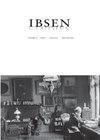Diderot, Ibsen, and the Drame Lyrique in Scandinavia
IF 0.1
0 THEATER
引用次数: 0
Abstract
Diderot devised what he himself perceived as a completely new kind of contemporary theater. This part of his output has been somewhat overshadowed by his more general contributions to the French Enlightenment. A huge interest in his Encyclop edie and in his highly experimental narrative prose developed in the 1950s and 1960s, alongside the rise of le nouveau roman (Fellows 1970, 96). Meanwhile, to this day, his crucial texts on theater remain largely inaccessible to modern readers unfamiliar with the French language. His plays are rarely put on by theaters, in contrast to his philosophical texts, which, paradoxically, are regularly staged (Frantz 2004, 36). His innovative drama and theater theory should, however, be of particular interest to the study of Ibsen’s contemporary plays, with which they resonate in arresting ways. A whole range of similarities will strike anyone who compares Ibsen’s contemporary plays with Diderot’s drama and writings on theater from the 1750s. The question of Ibsen’s turn towards a new form of contemporary drama at a rather late stage in his career has puzzled critics since his own lifetime. A common opinion is summed up by a student writing in the year after his death: ‘Ibsen is French Technic plus Northern Genius’ (Robbins 1907, 4). These two elements, the method of the well-made play as practiced by Scribe and his school, and a somewhat mysterious northern component, are echoed in scholarship throughout the twentieth century. In his seminal study Ibsen’s Dramatic Technique, P. D. F. Tennant狄德罗、易卜生与斯堪的纳维亚德拉姆抒情诗
狄德罗设计了他自己认为是一种全新的当代戏剧。他的这部分作品在某种程度上被他对法国启蒙运动的更普遍的贡献所掩盖。20世纪50年代和60年代,随着新罗马主义的兴起,人们对他的百科全书和高度实验性的叙事散文产生了极大的兴趣(Fellows 1970,96)。与此同时,时至今日,不熟悉法语的现代读者仍然无法接触到他关于戏剧的重要文本。他的戏剧很少在剧院上演,而他的哲学文本却经常上演(Frantz 2004,36)。然而,他创新的戏剧和戏剧理论应该对易卜生当代戏剧的研究特别感兴趣,他们以引人注目的方式与之产生共鸣。任何将易卜生的当代戏剧与狄德罗的戏剧和1750年代的戏剧作品进行比较的人都会发现一系列的相似之处。易卜生在其职业生涯的后期转向一种新的当代戏剧形式的问题,自他一生以来一直困扰着评论家。一位学生在易卜生去世后的一年里写道:“易卜生是法国技术加北方天才”(罗宾斯1907,4),总结了一个共同的观点。这两个元素,斯克里布和他的学校所采用的精心制作的戏剧方法,以及一种有点神秘的北方成分,在整个二十世纪的学术界都得到了呼应。在他的开创性研究易卜生的戏剧技巧,P.D.F.坦南特
本文章由计算机程序翻译,如有差异,请以英文原文为准。
求助全文
约1分钟内获得全文
求助全文

 求助内容:
求助内容: 应助结果提醒方式:
应助结果提醒方式:


